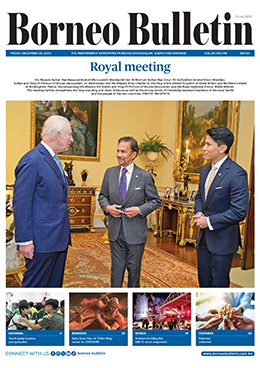With reference to Disappointed Patient’s letter, ‘Patient care should come first’, published in the Opinion page on July 17, 2024, I would like to empathise with the problem raised. This is indeed an example of management breakdown at a professional level, possibly involving medical ethics. How could a patient with serious ailments, on monthly appointment with physician, be seen by a non-medical personnel to listen to complaints for conveyance? This is a moral issue on the part of the physician for failing to reschedule or arrange another specialist to deputise.
If we look at issues raised by His Majesty Sultan Haji Hassanal Bolkiah Mu’izzaddin Waddaulah ibni Al-Marhum Sultan Haji Omar ‘Ali Saifuddien Sa’adul Khairi Waddien, Sultan and Yang Di-Pertuan of Brunei Darussalam during his unscheduled visit to the health authority on May 25, 2024, they were mostly what can be termed concerns for management nitty-gritty and essential for effectuality at all levels.
On the issue of interpersonal mannerism, for instance, between the public and hospital staff, it should be a key management area of any hospital chief executive officer (CEO). In the context of Brunei, such mannerism must take into consideration a few relevant backdrops, namely, culture, free medical services, CEO quality, concept of civil servant and doctor shortage.
Although culturally, Bruneians are renowned for being fairly meek, both in behaviour and conversation, younger people nowadays are more direct, eloquent and abrasive, and tend not to accept ‘no’ for an answer. On the other hand, civil servants tend to see themselves as ‘bosses’ rather than ‘servants’.
When the younger generation’s openness is set against the antiquated concept of civil service, there is no surprise that the two are at constant loggerheads.

This is further compounded by public expectation that the free medical services provided by the government are taken as rights rather than as transient benefits. But such loggerheads, if not addressed at the causality level, can appear as chicken-and-egg viciousness. The chief must not be blindsided by just taking one element and forgetting the other. To put up inanimate warning for legal action at every counter should any member of the public be found discourteous or violent towards hospital staff, can be futile, even laughable, as putting no-littering sign in the absence of littering bins.
Good CEOs, as in many good hospitals, normally opt for public relations officers or patient care assistants to inform, help and execute on-the-spot solutions. Of course, they must already be a good system in place, or it might be likened to a soldier entering a long battle with an empty canteen.
Doctor and specialist shortages are a high-level executive issue. Superficially, the public can blame it on recruiting failure. It may not be altogether true. To some extent, it’s true that recruitment in global open market needs to be competitive, committed and ongoing. Being competitive means, among other things, having an attractive salary and a scheme that includes superior institutional facilities and resources, support services, and high-quality diagnostic and therapeutic infrastructures.
Specialist qualification is different in its breadth and depth, including experience gap. For example, it may be outwardly impressive for a hospital to boast a 70-per-cent local workforce. In all probability, many of them, if not most, assume specialist stature based on the most basic and minimum requirement including experiences. This is not forgetting our improversational practice of appointing non-specialist doctors as ‘health specialists’, receiving specialist salary against half-baked specialist jobs.
Interestingly, His Majesty raised the issue of patients being treated differently, against social status. Such a practice of double standards is in fact quite ubiquitous in Brunei. It is rooted in our culture, hyped by certain external forces.
One example is the turning away of patients who are not from the right catchment areas, even if the ailment clearly requires immediate medical attention. One can chock it up to clerical issue but it is really more of a reflection on management soundness, which falls squarely on the shoulders of the CEO.
Maybe it is time to step up the effort to appoint a better quality CEO. Then again, the existence of executive positions higher than a chief tends to have a blurring effect on the question of accountability, especially when these executives wrongly assume some of the chief’s responsibilities, thus creating confusion and obscuring the distinct division of labour. Such a structural ineffectiveness is not limited to the healthcare industry, however. Nonetheless, it is a weakness that must be corrected to allow the chief full control of his or her job, including providing oversight to avoid possible moral and ethical issues, as experienced by Disappointed Patient. There simply is no better way than looking at the bigger picture.
Jerantut



















































